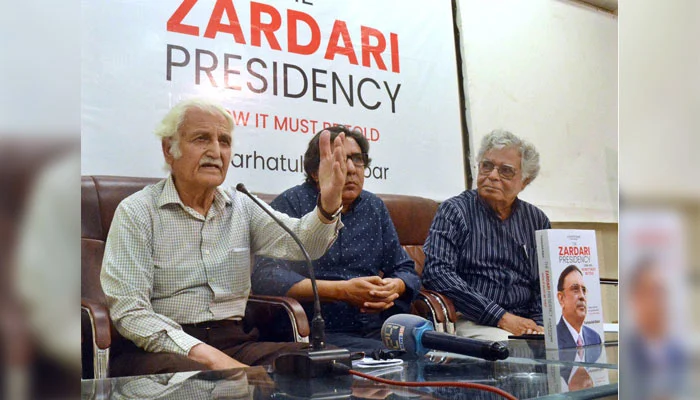Islamabad, May 27, 2025: Former senator and long-time spokesperson for President Asif Ali Zardari, Farhatullah Babar, officially launched his much-anticipated memoir titled “Zardari Presidency – Now It Must Be Told” at the Karachi Press Club on Monday. Spanning 500 pages, the book presents a rare, firsthand narrative of the turbulent events in Pakistan’s history.
“This is not a biography of President Zardari,” Babar clarified, “but a first-hand account of bizarre and dramatic events that impacted both the presidency and the nation.”
The memoir captures over 80 significant incidents, including some of the most dramatic political flashpoints of the era. Among them: the US raid that killed Osama Bin Laden, the tense civil-military confrontations, the notorious Memogate affair, and the controversial diplomatic fallout surrounding Raymond Davis.
The book discloses for the first time the draft charge sheet for General Musharraf’s impeachment such as a failed nuclear no-first-use proposal to India and secret talks between Saudi Arabia and Iran.
In a major disclosure, Babar shares for the first time the draft impeachment charges prepared against former President Pervez Musharraf, and reveals backchannel diplomatic efforts including a failed nuclear no-first-use proposal extended to India and behind-the-scenes negotiations between Saudi Arabia and Iran.
READ MORE: President Zardari Supports FTO’s Ruling Against Telecom Companies
Babar describes Zardari as a resilient but deeply political figure – misjudged, underestimated, and often vilified. “Zardari has been sinned against far more than he has sinned,” he said, likening his endurance to that of Sonya in Dostoevsky’s Crime and Punishment.
Portraying Zardari as a resilient but often misjudged politician, Babar remarked, “”Zardari has been sinned against far more than he has sinned,” likening his endurance to that of Sonya in Dostoevsky’s Crime and Punishment.
READ MORE: Rashid Latif Set to Reveal Match-Fixing Secrets in Upcoming Autobiography
Interestingly, Babar confirmed that he didn’t consult Zardari or the Pakistan Peoples Party (PPP) before writing the book. “This is the account of a president walking a tightrope between allies, judges, and generals,” he said, “written by someone who witnessed it all – pen in hand.”
Babar was quick to clarify the nature of the book, saying, “This isn’t a biography of President Zardari. It’s a personal account of strange and defining developments that shaped not just the Presidency, but the nation itself.”
The memoir offers an unfiltered lens into one of the most complex chapters in Pakistan’s recent political history told by someone who was at the very heart of it.









